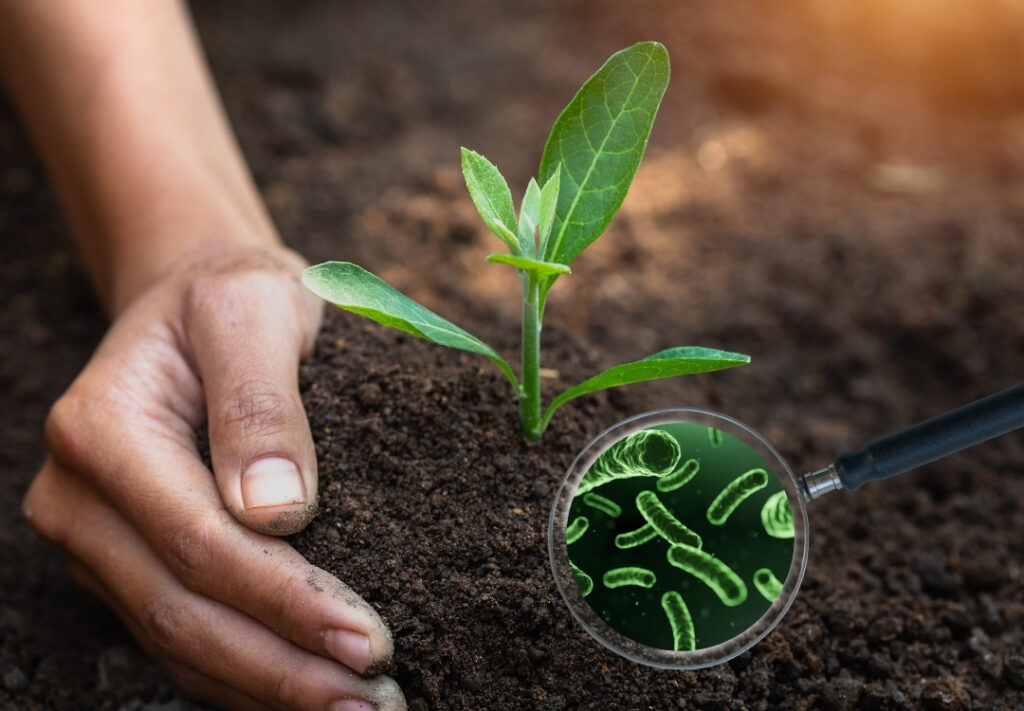How Bacteria and Fungi Contribute to Soil Fertility

The Importance of Microorganisms in Soil
Microorganisms play a crucial role in soil health and fertility. They are responsible for a series of essential processes that keep the soil productive and capable of supporting plant growth.
In this article, we will explore how bacteria and fungi, two of the main types of soil microorganisms, contribute to soil fertility and overall soil health.
Bacteria and fungi are vital components of soil ecosystems. They participate in processes such as the decomposition of organic matter, nutrient cycling, and soil structure formation.
Additionally, these microorganisms establish symbiotic relationships with plants, helping them obtain the necessary nutrients for their growth and development.
Understanding the role of these microorganisms and how we can promote their beneficial activity is fundamental for sustainable agricultural practices and maintaining ecosystem health.
Keep reading to discover more about the importance of microorganisms in soil and how you can apply this knowledge in your agricultural or gardening practices.
Microorganisms in Soil
Microorganisms are microscopic organisms that inhabit the soil, including bacteria, fungi, actinobacteria, algae, and protozoa.
These organisms play various and vital roles in soil processes, influencing its structure, fertility, and plant health.
Definition and Types of Microorganisms
Soil microorganisms can be classified into various categories based on their morphology and functions. Among the main ones are:
Bacteria: Unicellular and abundant, they are the most numerous microorganisms in the soil.
Fungi: Include yeasts and molds, form networks of hyphae that penetrate the soil.
Actinobacteria: Similar to bacteria and fungi, important in the decomposition of organic matter.
Algae and Protozoa: Less abundant but contribute to soil fertility.
Bacteria in Soil
Functions
Bacteria in soil perform several essential functions. They are responsible for the decomposition of organic matter, nitrogen fixation, nutrient mineralization, and promotion of plant growth.
These functions are fundamental to maintaining soil fertility and plant health.
Types of Beneficial Bacteria
There are many types of beneficial bacteria in the soil, including:
Nitrogen-fixing bacteria: Such as those of the genus Rhizobium, which form nodules on the roots of legumes.
Nitrifying bacteria: Such as Nitrosomonas and Nitrobacter, which convert ammonia into nitrate.
Decomposer bacteria: That decompose organic matter and release nutrients.
Examples of Important Bacteria
Rhizobium: Fixes atmospheric nitrogen in the roots of legumes.
Azospirillum: Promotes plant growth by producing phytohormones.
Pseudomonas: Contributes to the decomposition of organic matter.
Fungi in Soil
Functions
Fungi in soil also perform vital functions. They are primary decomposers of complex organic matter, help in the formation of soil aggregates, and form mycorrhizal associations with plant roots, increasing nutrient and water absorption.
Types of Beneficial Fungi
Some types of beneficial fungi include:
Mycorrhizal fungi: Form symbiotic associations with plant roots.
Decomposer fungi: Such as those of the genus Trichoderma, which decompose organic matter.
Examples of Important Fungi
Trichoderma: Decomposer that also acts in the biological control of pathogens.
Glomus: Mycorrhizal fungus that improves nutrient absorption by plants.
Penicillium: Decomposer that releases phosphorus from the soil.
Contribution to Soil Fertility
Improvement of Soil Structure
Microorganisms help improve soil structure by forming aggregates, which increase soil porosity and aeration. Fungi, especially with their hyphal networks, help stabilize these aggregates.
Nutrient Cycling
Microorganisms are essential in nutrient cycling, decomposing organic matter and transforming nutrients into forms that plants can absorb.
Bacteria and fungi work together to ensure the availability of nutrients such as nitrogen, phosphorus, and potassium.
Interaction with Plants
Microorganisms form symbiotic relationships with plants, such as mycorrhizae and nitrogen-fixing bacteria. These interactions are fundamental for efficient nutrient absorption and resistance to environmental stresses.
Practical Applications
Methods to Promote Beneficial Microorganisms in Soil
There are various agricultural practices that promote the activity of beneficial microorganisms in the soil, such as:
Crop rotation: Promotes microbial diversity.
Use of organic fertilizers: Such as compost and manure, which provide organic matter and nutrients.
Minimizing the use of pesticides and chemical fertilizers: To avoid harming beneficial microorganisms.
Soil Management Techniques
Other techniques include:
No-till farming: Reduces soil disturbance, favoring microbial activity.
Cover crops: Protect the soil and provide organic matter for microorganisms.
Inoculation of beneficial microorganisms: Use of commercial products containing beneficial bacteria and fungi.
Case Studies
Practical Examples of Agricultural Successes
Sustainable Agriculture in the Brazilian Cerrado: Use of nitrogen-fixing bacteria in legumes resulted in more fertile and productive soils.
Vineyards in France: Application of mycorrhizal fungi improved the health of vines and the quality of grapes.
Rice Fields in Asia: Use of organic compounds and crop rotation increased microbial biodiversity and productivity.
Research Results
Studies show that the introduction of beneficial microorganisms can significantly increase agricultural productivity and soil health. For example, the inoculation of Trichoderma in strawberry plantations reduced the incidence of diseases and increased fruit production.
Conclusion
Microorganisms are essential for soil health and fertility. Bacteria and fungi perform vital functions in the decomposition of organic matter, nutrient cycling, and promotion of plant growth.
Agricultural practices that promote the activity of these microorganisms are fundamental for long-term sustainability and productivity.
Continued research and application of knowledge about soil microorganisms are essential to face future agricultural and environmental challenges.


